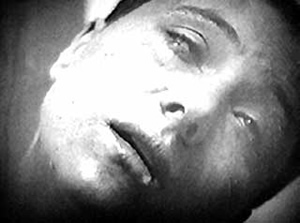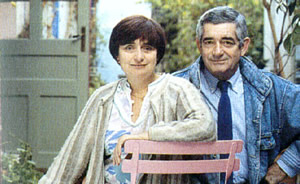
It is very likely that nearly every one has been very nearly certain that something that is interesting is interesting them...
27 February — Friday§ La Passion de Jeanne d'Arc | Dir. Carl Theodor Dreyer, 1928 | 82min | DVD screened in The Devil's Eye Film Series curated by Justin Andrews | IMDb link
23 February — Monday
§ Scratch | Dir. Doug Pray, 2001 | 92min DVD | IMDb link
Ed Morales in the Voice: "Scratch's central narrative shows how a new generation of DJs were inspired by GrandMixer DXT [as heard on Herbie Hancock's 1984 "Rockit"]. They became part of a growing scene dedicated to hip-hop's communal 'battling' aesthetic, progressing from mixing to beat-juggling, and finally, body-spinning in annual competitions like Skratchathon and the DMC U.S. finals, both documented in the film. One sequence, featuring DJ Shadow 'digging' for beats among piles of vintage LPs in a record store basement, demonstrates hip-hop's postmodern genius for making gems out of pop detritus." Below, Qbert from Mr KD Scrapbook.
21 February — Saturday
§ Georges Perec | Je me souviens: les chose communes I | Paris: Hachette, 1978 | 147pp
"Je me souviens d'Ephraïm Zimbalist junior" (439). As do I, but why? • I mind the opaque entries in Perec's inventory of memory no more than I do those in Joe Brainard's, even if that opacity must be imagined several shades more impenetrable in the French case than the American where I'm concerned. What I do regret, however, is passing up an opportunity to buy the marvelous book someone painstakingly compiled in order to show Perec's "common things" to readers for whom they'd grown uncommon. I knew, there in La Hune on whatever afternoon it was in 1998, that I'd want it—and now I do! Hélas slash dammit: Wo es war, soll ich werden.
§ Rebecca Saxe | "On Human Nature: Reading Your Mind" | Boston Review 29.1 | February / March 2004 | 39-41
"Until sometime between their third and fourth birthdays, young children seem not to understand that the relationship between a person's goals and her actions depends on the person's beliefs about the current state of the world.... In the first stage, children think the mind has direct access to the way the world is; they have no room in their conception for the way a person just believes it to be" (39). • "We seem to be equipped with a special mental mechanism—a special faculty or module in our minds—dedicated to understanding why people do the things they do" (39). • The problematic Saxe rehearses is made a bit quaint by the desire to trace the intersubjective circuitry back to a pin-pointable region of the brain (which would be to strike out the "reading" part of the "reading minds" metaphor in her subtitle). Lacan's reflection, back in 1955, is more interesting: "The Queen thought the letter was safe because there it was, bang in front of everybody. And the minister also leaves it out in the open, thinking that therefore it can't be taken. It isn't because he is a strategician, but because he is a poet, that he wins, until the intervention of the super-poet, Dupin" (Seminar II, "Odd or Even," 23 March 1955).
§ Hilary Putnam | "The Chosen People" | Rev. of The Jewish Political Tradition, Volume II: Membership, edited by Michael Walzer et al | Boston Review 29.1 | February / March 2004 | 45-46
Drawing on what sounds like an excellent book, Putnam revisits the medieval debate over how best to interpret the "chosenness" of the Jewish people. Putnam identifies two powerful but irreconcilable models: "the unique genetic endowment model of the twelfth-century philosopher Judah Halevi (which the commentators correctly characterize as 'racialist') and, strongly opposing it, the rationalist model of Maimonides, according to whom Abraham was a philosopher (!), who discovered the truth of monotheism through pure reason, as did Moses later (!), and who founded a community based not on a common descent but on a true knowledge of God. The unique genetic endowment model of Judah Halevi (the endowment in question is a 'divine thing,' which prophets in particular must possess) was, interestingly, most influential among the Jewish mystics and is found in an intensified form in portions of the famous kabbalistic work the Zohar. The Enlightenment, however, brought with it a powerful attack by Spinoza on the notion of election, after which the many Jews who were not willing to turn their backs on the Enlightenment and its ideals of reason and universal human equality struggled to find an acceptable interpretation—even if it was obviously a re-interpretation—of that idea" (45; exclamatory punctuation in original).
§ John Whale | "For a Second Opinion" | Rev. of A History of Roget's Thesaurus by Werner Hüllen | TLS 5263 | 13 February 2004 | 7
Mrs. Thrale (later Mrs. Piozzi) enlivens an otherwise not very edifying review: "Even when a fresh word seems the right recourse, a thesaurus may not be the place to look for it. You may light on a word you are not sure how to use. Mrs. Piozzi, quoted by Hüllen, on synonyms for the verb 'abandon': 'a man forsakes his mistress, abandons all hope of regaining her lost esteem, relinquishes his pretensions in favour of another, gives up a place of trust he held under the government, deserts his party, leaves his parents in affliction, and quits the kingdom forever.'"
§ Michael Witt | "In Praise of JLG" | Rev. of Godard: A Portrait of the Artist at 70 by Colin MacCabe | Sight & Sound 14.2 | February 2004 | 8-9
By "situating Godard's work primarily through reference to a history of ideas rather than to a history of forms, MacCabe's account prioritises Godard as a critic-philosopher over his practice as a poet-artist" (9). • MacCabe "cordons off much of Godard's private life and the book is relatively low on biographical content. One nevertheless comes away with a set of impressions of Godard as a human being: demanding, funny, volatile, devoted to his art, and as Gilles Deleuze put it, 'someone who works a lot'" (9). • Witt cites a sentence of MacCabe's that struck me in the reading as well: "in a world in which we are entertained from cradle to grave whether we like it or not, the ability to rework image and dialogue, light and sound, may be the key to psychic and political health" (9). • Godard as "severe Protestant pastor" (8).
§ Tiphaine Samoyault | "Le désir d'écrire" | Rev. of La préparation du roman I et II by Roland Barthes | La Quinzaine Littéraire 868 | 1-15 January 2004 | 13
The third cycle of Barthes's seminar at the Collège de France, and the last before his untimely death in 1980, was devoted to the desire for language and the will-to-write. He figured the work as one of "preparing" for a novel, consoling himself after his mother's death in 1978 with the thought that Proust, too, had been unable to set to work on the Recherche so long as his beloved "maman" was still alive. • "Ce volume apparaît bien vite comme une sorte d'encyclopédie du vouloir-écrire, de ses raisons et de ses déraisons."
§ Edith Hall | "Ancient Evasions" | Rev. of Slaves and Other Objects by Page duBois | TLS 5262 | 6 February 2004 | 28
Hall approves, with some reservations, duBois's "timely and passionate book" that "reinstates slaves at the centre of the ancient household and psyche." • "DuBois is...fascinating on the consistent ancient evasion of the terrifying possibility that slaves might feel somewhat angry. Slave-owners' rage was openly acknowledged, and ancient slaves were represented as lamenting the whippings they endured, but there is absolutely no ancient equivalent of the account in Frederick Douglass's autobiography of his furious confrontation, as a young slave, with Mr. Covey 'the nigger-breaker.'"
20 February — Friday
§ Much Ado About Nothing | Dir. Marcia Joy Douglas | Hauck Auditorium, University of Maine
Two student actors, Kat Johnson as Beatrice and Christopher G. Franklin as Benedick, made delightful work of their proto-screwball dialog. • Benedick, lured to love: "Shall quips and sentences and these paper bullets of the brain awe a man from the career of his humour? No—the world must be peopled! When I said I would die a bachelor, I did not think I should live till I were married" (2.3). • Radical Dogberry: "Leonato: Neighbours, you are tedious. Dogberry: It pleases your worship to say so, but we are the poor duke's officers. But truly for mine own part if I were as tedious as a king I could find in my heart to bestow it all on your worship. Leonato: All thy tediousness on me, ah? Dogberry: Yea, an 'twere a thousand pound more than 'tis, for I hear as good exclamation on your worship as of any man in the city, and though I be but a poor man, I am glad to hear it."
§ At work — the so-called "Spring" of 2004
It suddenly strikes me as curious that I so seldom talk directly about the work I do at the metaphoric factory after which this site is named: the University of Maine. (Hard not to mention all the non-metaphoric factories that have closed in the five years I've lived in the state: as I write, the decision as to whether Eastern Fine should be allowed to "go cold" is being worked out in court and board rooms, while Georgia Pacific threatens to close its doors if Old Town residents don't agree to pay $25 million for the privilege of taking a toxic sludge dump off the company's hands....) • Briefly, then: I'm six weeks into a semester that finds me teaching a graduate-level introduction to Poetics and the gateway course into our undergraduate English major called Foundations of Literary Analysis. I'm also helping to plan for the NPF Conference on the 1940s this summer (note extended deadline for proposals: 15 March) and coordinating the New Writing Series, which kicked off with Bill Luoma and John Wilkinson last week and moves to a weekly rhythm after our spring break. • Though poetry can, and perhaps should, break with—or at least momentarily suspend—strategic communication, my job sometimes requires me to propagandize on its behalf: the two-minute video feature accessible here as a 3mb Quicktime file originally aired on local television during a break in an closely-watched hockey game. It's as hokily one-dimensional as any ad for a local car dealer, but seeing the faces of (in order of appearance) Rosmarie Waldrop, Nate Mackey, Erin Mouré, Jerry Rothenberg, Lorenzo Thomas, Katie Daley, Nicole Brossard, Kathleen Ellis, Bob Grenier, Burt Hatlen, Carroll Terrell and Lee Ann Brown brings a non-ironic smile to my face. • Addendum on writerly proprioception: Jane Dark nominates pronouns as "the root of all ennui in writing" and while I can't entirely agree (there are so many such "roots": the Well-Nourished Moon feels crowded by pushy articles, and I once got very agitated about adjectives and proposed, absurdly, that criticism should learn to live without them—no surprise I wrote no criticism that year), I can say that the organization of this entry (mine, not JD's) around the first person pronoun is what spoils it for me. • Konvolut m gets the "how you sound" dilemma dead on: "It's very hard to write about this without either constructing a position from which I'm a wonderful person and a brilliant thinker, or offering an abject mea culpa; I wish to do neither."
15 February — Sunday
§ Intolerable Cruelty | Dir. Joel and Ethan Coen, 2003 | 100min DVD | IMDb link
Divorce lawyer (hers): "Objection!" Judge: "On what grounds?" Lawyer (out on a limb): "Poetry recitation?" • Wheezy Joe's demise aside, the gentlest Coen Brothers film I'm aware of. • Ebert: "I was reminded of Lubitsch's great Trouble in Paradise, which is about a con man, a con woman who loves him but can't afford him, and a rich widow who thinks she can buy him but would be happy enough to rent him for the season. By the end of that movie, everyone knows all about each other, and they accept the situation; if we cannot have what we want, they agree, let us at least be able to admire the way we behaved. ¶ Miles and Marylin acknowledge their mutual chicanery. Neither one is very nice. But, aw, come on, when she walks across the room and his heart leaps up, or when she looks at him in a closeup that undresses itself, what makes the Coens pull back from this emotion?" (link).
13 February — Friday
§ Gentlemen Prefer Blondes | Dir. Howard Hawks, 1953 | 97min DVD | IMDb link
"Le rythme, lui, sobre et calme est celui de la plupart des films de Hawks. Le ton hawksien est aussi éloigné dans sa sécheresse, du mépris que de la compassion ou de la connivence envers les personnages. Cette sécheresse qui est pour Hawks la recherche de la distance à partir de laquelle on peut stigmatiser une manie (la nymphomanie tranquille de Dorothy, la cupidité raisonnée de Lorelei, la précosité de Henry Spofford III), une obsession, un vice sans s'indigner ni salir celui qui en est la proie" (link).
31 January — Saturday
§ Immanuel Wallerstein | "'Soft Multilateralism': You Can't Go Home Again" | The Nation | 2 February 2004 | 14-19
The "soft multilateralism" practiced by U.S. administrations from Nixon to Clinton has been displaced by Bush's hawkish unilateralism: according to Wallerstein, the latter is doomed to failure and the conditions that encouraged acceptance of the former have evaporated. Wallerstein's unlikely-to-be-heeded advice that the U.S. grow up, accept some limitations to its power, and move along as "a strong country in a multipolar world" (20) is based on three claims: (1) that serious counterpowers (the EU, East Asia, the WSF, the "Group of 21," the South in general) have emerged and begun to use their variously-assembled strengths lucidly and strategically; (2) that nuclear proliferation is inevitable—and not necessarily bad; and (3) that neoliberal globalization is dead (18, 20). Persuasive? Perhaps not. But as one expects of Wallerstein after all these years: good to think with.
30 January — Friday
§ L'Atalante | Dir. Jean Vigo, 1934 | 89min DVD | IMDb link |Screened in the Devil's Eye Film Series, curated by Justin Andrews at the University of Maine
Dita Parlo is ravishing in just the off-hand way the person one falls in love with always is. Watching her one sees those "subtle, evanescent trivialities which swiftly pass over the other's body" that Barthes speaks of in A Lover's Discourse: "Something accommodates itself exactly to my desire (about which I know nothing)." • Shot: A frenetic crowd is pummeling the creep who snatched Juliette's purse: the camera tracks with the movement, the black bars of an iron fence flickering between our gaze and the action. • "What's intoxicating about Vigo's style is the way in which the prosaic reality of the life on the barge is charged with luminous undercurrents. Though the love story is at the center of the film, the narrative, such as it is, keeps being commandeered by Simon's Pere Jules or, during the couple's trip to a Paris cafe, the peddler who attempts to entice Juliette into spending a night in the city with him. In one blissful sidetrack, Jules gives Juliette a tour of his cabin, which he maintains as a storehouse of memorabilia from his travels around the world, and as each new bit of exotica is unveiled we're transported far away from the barge's cramped quarters.... As a believer in transcendence and passionate disruption, Vigo was always taking the plunge, following his heart into the ragged margins of life. He had a genius for disorderly, haphazard eloquence, and his dedication to anarchy made it impossible for him to follow the conventional steps. Even in this newly restored version—which contains some nine minutes of additional footage—the picture remains magnificently unresolved, an obscure, submerged treasure, gloriously outside our grasp" (Hal Hinson writing in the Washington Post about the version of the film restored and re-released in 1990).
§ Howard Singerman | "In Theory & Practice: A History of the Whitney Independent Study Program" | Artforum XLII.6 | February 2004 | 113+
Soft focus history of an institution that has now marked several generations of artists, curators, and art historians. Started in 1968, with a "discursive basis" in Artforum (the summer 1967 issue, Greenberg and Fried) and Ron Clark's "reading list"—which included Merleau-Ponty and Sartre, Marcuse and the Frankfurt School more generally, French structuralism, and texts by Brecht, Godard, and Robbe-Grillet—the ISP's theoretical "leanings" a decade later had shifted toward "semiotics and poststructuralism as they are informed by feminism and Marxism" (116). By 1988, according to Simon Leung, "AIDS and the politics of difference [had] completely impacted every aspect of the artworld" and the ISP registered the transformation: "what was happening in the world made the ISP polemics and education resonate exponentially for me" (170). • The formative faculty, in addition to Clark: Yvonne Ranier, Mary Kelley, Hal Foster, and Benjamin Buchloh. • Singerman closes with a contrast between Art-Rite, a journal founded by ISP alums in 1973, and Documents, founded by alums in 1991: the former's infatuated embrace of the art scene gives way to skeptical remove, the artist yields to the critic-curator, the vocation to the profession (170-71).
28 January — Wednesday
§ Robin Buss | "Saved by Film" | Rev. of Louis Malle by Pierre Billard, Godard by Colin MacCabe, and La Cinéphilie: Invention d'un regard, histoire d'une culture, 1944-1968 by Antoine de Baecque | TLS 5260 | 23 January 2004 | 23
Buss is annoyed by MacCabe's biography of Godard and never concedes it more than faint praise on the following model: "This biography will prove a helpful starting point for exploring the man and his films, despite its sometimes shaky generalizations, exaggerated judgements, sloppy proofreading and inability to decide whether titles should be given in French or English, which leads to one early piece being curiously renamed 'Charlotte and son Jules.'" • The parting shot: "Truffaut and Godard were disturbed adolescents for whom cinema became a salvation and a faith: Serge Daney spoke of 'entrer en cinéma' as one talks about 'entrer en religion.' Malle, by contrast, conventionally trained at IDHEC, before his apprenticeship to the oceanographer and filmmaker Jacques-Yves Cousteau, committed the sacrilege of seeing it as a profession. There was no place for that in the doctrines of cinephilia." • More on MacCabe's bio of Godard here and here.
27 January — Tuesday
§ L'univers de Jacques Demy | Dir. Agnes Varda, 1995 | 90min DVD | IMDb link
25 January — Sunday
§ Rob Hoerburger | "The Anti-Diva" (Profile of Norah Jones) | New York Times Magazine | 25 January 2004 | 24-29 | Link requires registration
"She settled in on the sofa, in front of a copy of 'Come Away With Me' sitting on the coffee table. 'It has plenty of flaws,' she said, pointing to the CD. 'I mean, I'm really proud of it, but maybe it's a little too mellow'" (28). • Perfectly preserved specimen of pop mythology: "There's a geek-chic aura to the group, who seem to understand the difference between being hip, a transitory, exclusive state, and cool, permanent and inclusive and unconcerned with others' perceptions" (27). • Trying to put my finger on the subtle malice that stirs through the piece: a kind of plausibly-deniable condescension toward the subject that undercuts the press-kit flattery. Suppressed sentence: she's an overrated fluke? • More on Jones here (see "In the air").
§ Peter Brooks | "The Shape of Time" | Rev. of Swann's Way by Marcel Proust, translated by Lydia Davis, and In the Shadow of Young Girls in Flower, translated by James Grieve | New York Times Book Review | 25 January 2004 | 11 | Link requires registration
Brooks admires Davis's work, finds Grieve less able—"he stumbles in some of the long sentences, which come out making no sense (this is never the case in Proust)"—and breaks the news that the final three volumes of the Viking retranslation will be forbidden to U.S. readers until at least 2019 because Random House renewed its copyright on the Scott Moncrieff-Kilmartin-Enright edition. • "It's not at present Proust the aesthete that engages us so much as Proust the anguished exponent of the drives and frustrations of love." • More on the Davis translation here.
§ J. Hoberman | "Vive la Resistance!" | Rev. of Godard: A Portrait of the Artist at 70 by Colin MacCabe | Film Comment | January/February 2004 | 76
"Godard is the fruit of many interviews, and — as a pithy digression detailing Sartre's interest in cinema or an offhanded observation that Truffaut was converted to cultural Marxism by Barthes's Mythologies demonstrates — MacCabe is amply conversant with French intellectual fashion. "By the summer of 1965, Godard was a central topic of cultural conversation," he writes. But what exactly did that mean? And didn't that conversation go two ways? Godard asked Barthes to be in Alphaville and wanted to cast writer Philippe Sollers in La Chinoise; he flashed his copy of On Grammatology in Le Gai Savoir and based Lotte in Italia on Althusser's essay "Ideology and Ideological State Apparatus." Is it unfair to complain that Godard could have been twice as long?" • More on MacCabe's bio of Godard here.
23 January 2004 — Friday
§ Ken Auletta | "Fortress Bush" | The New Yorker | 19 January 2004 | 53-65
The premise of the Bush administration, according to Auletta's loping and overly-long profile, is that the public don't like or trust the press: by holding reporters and the news media in contempt, the administration is thus merely enacting its solidarity with the good folks at home. Bush derides the "slicks" (the mass-circulation weeklies) and distrusts "the filter" (the news media tout court) and his people spend their time dodging reporters' phone calls and sticking to their daily message. So long as the pretender can be constructed as "tough-minded, decisive, and fair" (64), so long as he appears as "a person of conviction, character, and compassion" (65), the details can sort themselves out, since no one's really watching anyway.
§ Katha Pollitt | "Webstalker" | The New Yorker | 19 January 2004 | 38-42
Pollitt gives a surprisingly raw and often embarrassing account of her inability to break off relations with the "databody" of her philandering ex-lover. Her tracking of the unnamed (but eminently identifiable—given the many details she furnishes) lover and his prolific art-journalist new girlfriend is recounted in humorously self-deprecating terms, or at least that's the tone attempted. But the surface is continually broken by wrathful revenge fantasies, seething and self-lacerating jealousy, and still unquenched desire for the betrayer. There's a sick eloquence to the whole thing that more than once made me wonder how it made it through the New Yorker's editorial process. • A stray line: "But of course what my friend meant was that I ignored inconvenient subtexts, the meaning behind the meaning: that someone might say he loved you, but what really mattered was the way he let your hand go after he said it" (41).
§ Mary Ann Doane | "The Close-Up: Scale and Detail in Cinema" | differences 14.3 | Fall 2003 | 89-111
Doane's characteristically sharp-witted and historically-informed investigation of the contradictions surrounding the theory and practice of the cinematic "close up" is anchored on the recognition of two fundamental binaries: proximity versus distance (as denoted in the English term for the shot), and largeness versus smallness (as denoted in the French term gros plan). Setting out from a startlingly great text by Jean Epstein on "Magnification," Doane argues that "the close-up performs the inextricability of...two seemingly opposed formulations, simultaneously posing as both microcosm and macrocosm, detail, and whole" (93). • Along the way, Doane addresses various claims—those of Balázs and Aumont and Deleuze especially—that the close-up obeys an inherently anthropomorphic tendency, even when the manifest content of a shot is an inanimate object (shades of Lacan). These claims rest on the seeming inseparability of the close-up and the "the face" upon which it is so often trained: the close-up, conceived this way, "facializes" or "facefies" whatever it rests upon, rendering it simultaneously (and somewhat intoxicatingly) sensible and legible. • Doane is concerned to show that however much the close-up would seem to constitute a point of diegetic arrest, an escape "from the spatiotemporal coordinates of the narrative" (107), its meaning is in fact carried over from the play of camera shots and internal gazes that precede and follow it: even Garbo's face, at the close of Queen Christina, is not the "veritable degree zero of expression" that Roland Barthes saw in it, for "its blankness," according to Doane, "is forced into legibility by the pressure of the narrative culminating in that moment" (101). • The crux of the problem is stated concisely here: "The space of the narrative, the diegesis, is constructed by a multiplicity of shots that vary in terms of both size and angle—hence this space ["the whole"] exists nowhere; there is no totality of which the close-up could be a part. And certainly if one accepts the theories of the close-up's despatialization, it cannot be defined as a detail, since it occupies the only space there is, constituting itself as its own whole or totality, abolishing off-screen space. Is the close-up the bearer, the image of the small, the minute; or the producer of the monumental, the gigantic, the spectacular? This confusion, or the apparent collapse of the opposition between detail and totality, microcosm and macrocosm, the miniature and the gigantic, is crucial the ideological operation of the close-up, that which makes it one of our most potent memories of cinema" (107-108). • The article makes for a fitting homage to the late Naomi Schor's work in the 1987 volume Reading in Detail: Aesthetics and the Feminine, a book which all six of the contributions to this special issue of differences honor by once again taking up, and extending, the problematic and practice named in its title.
§ Mary Beard | "Four-Day Caesar" | Rev. of Tacitus: Histories I, edited by Cynthia Damon | London Review of Books 26.2 | 22 January 2004 | 16-18
Beard checks her dislike for the edition under review long enough to advocate for a relatively neglected aspect of Tacitus's corpus, the four ("and a bit") surviving chapters of the Histories. • "The violently radical use of Latin—particularly, but not only, in the Annals—defeats almost all translators" (18). • Tacitus, summarizing the fate of Galba, one of the four emperors to reign in the year following Nero's suicide in 68 CE: "omnium consensu capax imperii, nisi imperasset ('by universal consent capable of being emperor, had he not been one')" (17).
§ Peter Brooks | "A Place without Argument" | Rev. of Clueless in Academe by Gerald Graff | TLS 5259 | 16 January 2004 | 11
Brooks cites an 1892 Harvard report on the teaching of English composition (inaugurated at Harvard in 1885): "in quantity the work is calculated to excite dismay; while the performance of it involves not only unremitted industry, but mental drudgery of the most exhaustive nature." Brooks picks up from there: "So it is that the cornerstone work of the American university has fallen on the most poorly paid and least celebrated of its members, freeing the higher ranks to pursue Wissenschaft."
§ J.C. | "NB: More Poetry Babble (an ongoing series)" | TLS 5259 | 16 January 2004 | 14
In which Lisa Jarnot's poetry (specifically her handling of short heavily-alliterated lines in Ring of Fire), and Patrick Pritchett and Alison Cobb's bookjacket advocacy of it, are presented as self-evidently ridiculous.
§ John Gray | "Ethically Engineered" | Rev. of The Future of Human Nature by Jürgen Habermas and Enough by Bill McKibben | TLS 5259 | 16 January 2004 | 9
"Habermas's achievement in this short, dense, suggestive volume is to reconnect contemporary thought in bioethics to the central traditions of Western philosophy and religion." Specifically, the secular humanist Habermas traces "the root of the liberal ideal of autonomy" to "a religious conception of the person," as in Kierkegaard's "explicitly theocentric account of authentically human existence" as "achievable only in the presence of God." Gray faults Habermas for retaining too stark a distinction between human and animal: "He is right that profound ethical issues are raised by the power to shape new human beings, but why should that be more problematic than similar technological interventions into the lives of other animals?" • Writing of McKibben's book, Gray mentions in passing the "extropians," that is, "persons for whom having a body at all is an intolerable constraint on freedom."
§ John Sutherland | Diary | London Review of Books 26.2 | 22 January 2004 | 31
Sutherland surveys the world of academic publishing, where the books are unaffordable and unreadable, where price-gouged libraries purge their acquisitions and opt for ILL, where the learned journals are "inherently unsexy," and the few remaining publishers find "that the stuff coming out of graduate programmes nowadays is too damned dull" to publish.
22 January 2004 — Thursday
§ Groundhog Day | Dir. Harold Ramis, 1993 | 101min VHS | IMDb link

From the "fiche pedagogique" on the film (released in France as Un jour sans fin) found at the Film et Culture website: "Un jour sans fin met en place un dispositif simple: Phil Connors est condamné à revivre indéfiniment la même journée dans une petite ville coupée du monde par le blizzard. Il lui appartiendra d'explorer les avantages et les désagréments de cette situation, de surmonter les embûches de la répétition. Le caractère véritablement original du film repose sur la manière dont la mise en scène parvient à maintenir l'intérêt du spectateur à l'intérieur de ce cadre rigide, grâce à une subtile rhétorique."
16 January 2004 — Friday
§ Mona Lisa Smile | Dir. Mike Newell, 2003 | 117min | IMDb link
Julia Roberts not only seems to be visiting 1953, she seems to be visiting it as Julia Roberts: the perky faux-startled smile of the star warding off an autograph convulses her face over and again. • I never was able to place the "source" of Julia Stiles's conspicuously proper diction, but every time she spoke I was sent scrambling for the allusion: Jane Fonda? Kate Hepburn? Grace Kelly? Forced to choose, I'd have to go with Grace. • An early scene where Maggie Gyllenhall is made to perform a round of exhuberant girl-among-girls physicality and nearly pulls it off. • Kirsten Dunst's face attaining to serpentine hideousness in more than one scene of ego-destructive gossip delivery. • Sinking feeling when Juliet Stevenson's school-nurse character is dismissed, early on, for supplying a diaphragm to a student: "the only actually interesting person in this movie is leaving already?!" • Marcia Gay Harden as the bad outcome: sort of like Mary being a librarian in the "George never lived" passage of It's a Wonderful Life. • No mention that Soutine's carcass cites that of Rembrandt. • A mist, a loading dock, befuddled students meander about awkward and overdressed: the man uncrating the large Pollock says to Julia: "You're just in time!" • In the same genre, see All I Wanna Do (original title: Strike), noted here on 4 August 2003.
Early January 2004
§ Scattered impressions & screen memories
IN THE AIR — "The Sublimity of Indifference," a delightful twenty-two track cd compiled by Adam White in exchange for a spare copy of the ILS's poetry-world remix of Flaubert's Dictionary of Received Ideas. There's something new to hear in the handful of already familiar cuts (Nancy Sinatra's "Bang Bang," Yaz's "Nobody's Diary," Patsy Cline's "Westward Wind," even Blue Oyster Cult's "Dust in the Wind") and lots to like in the new (to my chronically inattentive ears) stuff by Basement Jaxx, the Cansecos, France Gall, ESG, Delta 5, and Sufjan Stevens. Thanks, Adam! • Other gifts in the mail included Big Bill Broonzy Sings Folk Songs from Folkways (the voice brighter than I remembered, the guitar livelier) and Norah Jones's Come Away With Me, which after several listens I'm starting to regard as more than the sum of its anodyne parts. • I've now also got a double of Outkast's new cd, still shrinkwrapped, which I'll gladly mail to the first person who asks for it (comments@thirdfactory.net). | ON SCREEN — Lagging back at the second installment (DVD) of The Lord of the Rings, which I found every bit as negligible as the first. I'm not normally immune to compulsory culture, but for some reason this series—like the Matrix (including the first) before (and during) it—just passes over my interests and desires, my subjectivity I guess one might say, without making the slightest ripple (nonsublime indifference?). | READING — Read, ever so slowly, the first half or so of Gerald Frank Else's 1957 translation and detailed commentary on Aristotle's Poetics. I'd forgotten, so many years after my brief encounters with Greek under the excellent tutelage of Page DuBois at UCSD, the pleasures of a good scholarly footnote attacking a fellow classicist's construction of a passage. • Also read, if somewhat haphazardly, through the French and English texts of Lacan's second seminar (Fall 1954 - Spring 1955) on "le moi dans la theorie de Freud et dans la technique de la psychanalyse: the kind of reading one does when trying to decide whether to "really" settle in with a text (I'm still undecided). | WEATHER — And of course, nothing herein noted represents more than the briefest interruption to a primary text consisting entirely of phrases like: "Fuck it's cold." (Kevin Bennett's photo below shows an 1871 Bangor building destroyed over the course of several days by fire and ice.)
6 January 2004 — Tuesday
§ Nathaniel Dorsky | Devotional Cinema | Berkeley: Tuumba, 2003 | 52pp
"Transformative film rests in the present and respects the delicate details of its own unfolding. How is this small miracle achieved? How do we manifest nowness in the ongoing context of the relative? It is not unlike having a heartfelt discussion with a friend. You hear what your friend says, and you respond from a place you may never have responded from before. You hear your friend again, you wait a second, and there's an actual moment of connection, a moment of genuine exploration that touches upon things never quite touched upon before. That's when heart, intelligence, instinct, and awareness all come together. Reality opens and responds to itself. ¶ We are certainly all familiar with the moments that are not like this. Conversation can be an exhausting exchange of self-confirming, predigested concepts with no real exploration: everything is already 'known' and is motivated by a need to maintain the status quo of oneself in relation to the other person. Nowness is tainted by the need to accomplish something, to stay in control. [...] When the absolute and temporal are unified, film becomes a narrative of nowness and reveals things for what they are rather than as surrogates from some predetermined concept. It is the fear of direct contact with the uncontrollable present that motivates the flight into concept. The filmmaker seeks the safety net of an idea, or something to accomplish that is already known. ¶ If we do relinquish control, we suddenly see a hidden world, one that has existed all along right in front of us. In a flash, the uncanny presence of this poetic and vibrant world, ripe with mystery, stands before us. Everything is expressing itself as what it is. Everything is alive and talking to us." (32, 35).
§ "Invisible Jukebox: Damon & Naomi" | The Wire | January 2004 | online link
5 January 2004 — Monday
§ Before Stonewall | Dir. Robert Rosenberg and John Scagliotti, 1984 | VHS 87min | IMDb link
§ After Stonewall | Dir. John Scagliotti, 1999 | VHS 88min | IMDb link
4 January 2004 — Sunday
§ Colin MacCabe | "The Arrière-Boutique — Anne-Marie Miéville and Rolle" and "Envoi" | Chapters 5 and 6 of Godard: A Portrait of the Artist at 70 | New York: FSG, 2004 | 239-335
A predictably smart, appropriately ambivalent account of Godard's work in the period roughly from Ici et ailleurs forward, including the television projects, Sauve qui peut, the Histoire(s) du Cinema, and Eloge de l'amour. (Not to mention the unmade projects, including an adaptation of the Dora case study, with Paul Newman slated to play Freud.) • "The original Bazinian premises had been that cinema was the art of the real, that the technology of the camera provided a new set of aesthetic possibilities, and that the filmic image offered a new aesthetic dispensation for the West. Godard had always stressed the crucial role of subjectivity in this new objective art — the positioning of the camera was crucial. But as the image became more and more stereotyped, as it became the crucial cement of an ever more rapacious and unjust world, Godard abandoned hope in it, opting for an imaginary politics which would link him to suffering humanity, and for an elaborated soundtrack which would provide the correct way of reading the image" (243) • The book's closing words: "Godard himself said in a press conference for the Histoire(s) in Cannes that he and Miéville's audience can most accurately be described as 100,000 friends around the world. ¶ Attempts in the twentieth century to link avant-garde art to a progressive politics have all been dismal failures. Godard's description of his relationship to his audience in terms of friendship alters the terms of those political discourses. From the Romantics on, when Shelley promised to legislate for humanity, art has been promising to deliver the world. If we reject the humanist claim on eternity and the political promise of aesthetic salvation, then perhaps all that is left is individual witness. I do know that in writing this book I committed myself to looking again and again at Godard's work. The life often became tiresome; we are all, like the dog returning to its vomit, condemned to repeat within a sadly limited repertory. But the work never failed to intrigue, to illuminate and to inform. Much of it is extremely difficult to obtain. Some of it is very uneven. But the worst is never less than intelligent, and the best is the best there is" (335).
§ Leo Marx | "Believing in America: An Intellectual Project and a National Ideal" | Boston Review 28.6 | December 2003 / January 2004 | 28-31
3 January 2004 — Saturday
§ Nicholas Spice | "I Must Be Mad" | Rev. of Wild Analysis by Sigmund Freud, translated by Alan Bance and introduced by Adam Phillips (Penguin, 2002) | London Review of Books 26.1 | 8 January 2004 | 11-15
§ Mark Ford | "Now for All the Rest" | Rev. of Pieces of My Mind: Writings, 1958-2002 by Frank Kermode | TLS 5255/5256 | 19 & 26 December 2003 | 28
1 January 2004 — Friday
§ Sex in the City | Season 5 | DVD
nb archive
June 1-15, 2003 • June 16-30, 2003







